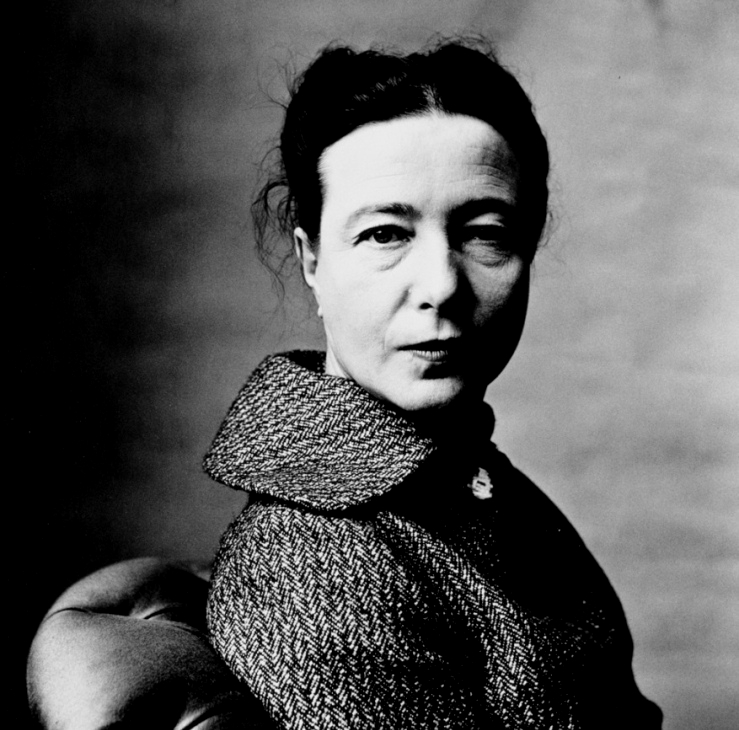Sex, Love, and Letters: Writing Simone de Beauvoir
Judith G. Coffin
Cornell University Press, $32.95 (cloth)
Why did I write all of this to you? Because I have never felt such a human closeness as I do with you, Madame, whose writing can express the whole gamut of emotions.
— from a 1972 letter to Simone de Beauvoir
In the fall of 1946, Jean-Paul Sartre, the thinker most publicly associated with the philosophy of Existentialism—a system of thought that declared human existence most readily accounted for by an individual’s search for authentic moral imperatives—was under attack. Simone de Beauvoir, Sartre’s intellectual companion of many years, decided to write an essay in defense of both the philosopher and the philosophy, using herself personally, as an individual, to illustrate the value of Existentialism’s claims. A breeze, she thought, as she had always considered herself a free agent, herself devoted to the pursuit of authenticity. However, the more that Beauvoir thought about her own life, her biographer, Deirdre Bair, tells us, the more surprised she was by an unexpected idea that had begun to trip her up—and she soon found herself in possession of “‘the very profound and astonishing realization’ that it mattered that she was different from Sartre, ‘because he was a man and I was only a woman.’”
Beauvoir’s gift was her urgent appeal to lived, rather than received, experience.
When it came right down to it, she further realized, that reality undercut almost everything she intended her essay to demonstrate. It struck her forcibly that it carried more weight than she had previously been willing or able to understand. Throughout the history of the race, she now saw, people who were women had systematically had less power, less standing, less definition. They were, in fact, what Existentialism called “Other.” The condition of birth into which she herself had been born was the single most powerful determinant in the shaping of a life consigned to organized subordination. To not see this, the “otherness” of your life if you were a woman, was to live in a permanent state of fantasy.
Out of these insights came The Second Sex (1949), the encyclopedic examination of the historic position of women—culturally, politically, biologically—that, for a few million people around the globe, remains comparable to Capital, The Interpretation of Dreams, or War and Peace, so all-encompassing is its presentation of how women became and remained second-class citizens. Twenty years after it was written, when a new wave of world feminism burst upon the world, the book became its bible.
Upon its publication, first in French in 1949 and then in English in 1953, The Second Sex produced a storm of critical response, almost entirely negative. The Vatican put it on the Index list of prohibited books, Alfred Kinsey said it was of no interest to science, Albert Camus said it made Frenchmen look ridiculous; and in the United States both Mary McCarthy and Hannah Arendt heaped high-class scorn on Beauvoir.
Nonetheless, the book sold 22,000 copies in the first week after publication. It was as though a signal had gone out to the women of the world: if you never read another book, you must read this one. And they did. In their tens of thousands, they announced themselves significantly affected by a wealth of information experienced as revelatory. Many felt as though the book had been written especially for them, and they wrote to tell the author so. Thus began an epistolary love affair between Beauvoir and her readers that ended only with her death in 1986.
It was not only, or even mainly, The Second Sex that bound readers to Beauvoir for decades. More than anything it was the memoirs, following one upon another, that accounted for the remarkable loyalty thousands of women, and some men too, showered upon the gradual unfolding of a life lived almost entirely in the public eye, at the same time that its inner existence was continually laid bare and minutely reported upon. Fearless was the word most commonly associated with these books as, in every one of them, Beauvoir, good Existentialist that she was, wrote with astonishing frankness about sex, politics, and relationships. She recorded in remarkable detail, and with remarkable authenticity, everything she had thought or felt at any given moment. Well, kind of. She recorded everything that she was not ashamed of. Years later, after she and Sartre were both dead, appalling behavior came to light that she had either omitted from the memoirs or put a positive spin on.
Sex, Love, and Letters is a richly researched study based on Judith Coffin’s encounter with a batch of these letters that a sympathetic curator put into her hands one day while she was working on The Second Sex in the Bibliothèque Nationale de France in Paris. As she writes in her introduction, “Nothing prepared me for the drama I found the first time I opened a folder of readers’ letters to Simone de Beauvoir. . . . What I found was an outpouring of projection, identification, expectation, disappointment, and passion.” Correspondents “asked for advice on marriage, love, and birth control; they confessed secrets and sent sections of their diaries for her to read. The letter writers’ tone was unexpected as well, alternately deferential and defiant, seductive, and wry.”
Although Beauvoir’s replies to these letters are not included here, to an extraordinary degree, this correspondence is marked by an assumption of intimacy between reader and writer that is in itself a revelation. Clearly, those who had been most touched by whichever book was being read experienced Beauvoir as a familiar; someone to whom they could write as freely as she had written to them. One reader said it for many: “Simone de Beauvoir, you belong to all of us, that is why I do not call you Madame.”
These correspondences are marked by an assumption of intimacy between reader and writer that is in itself a revelation.
Yet Coffin, reading these letters some sixty years after they’d been written, still could not but marvel over the fact that “ordinary women and men came to cast [Beauvoir] as an interlocutor in their everyday dramas, asking her questions more appropriate for an advice columnist than an intellectual and writer.” What, given the formality of French culture, explained this phenomenon? Celebrity culture? Postwar permissiveness? The changing position of women in France (they had only just gotten the vote)? Beauvoir’s own “scandalous” independence, as attested to by her open, unmarried relationship with Sartre?
The desire to explore these questions prompted Coffin to write a social history that would make instrumental use of what readers had written to Beauvoir over a period of some forty years. The correspondence proved raw material for such an undertaking as Beauvoir’s followers read each book that she wrote in relation to the last one, thus referring Coffin repeatedly to the ongoing social and political dramas in which Beauvoir regularly involved herself—the postwar struggle for a classless society, French guilt over their collaboration with the Nazis, the Cold War, the Algerian war—allowing her to write engagingly about all of these historic developments while paying strict attention to the vivid immediacy of those letters that range far and wide across the categories of sentiment, education, and motive, revealing personalities that run the gamut from the elegant to the crude, the appreciative to the demanding.
Mostly, Beauvoir’s correspondents wrote to her as a woman reader to a woman writer, a “dynamic that vexed her for much of her career,” even though she profited from the material inscribed in each and every letter. Beauvoir herself repeatedly observed that these letters provided her with an anchor in the world, a belief that her thoughts were welcome. She even went on to claim that every work of literature was a collaboration between the writer and the reader. The sentiment implies that, over the years, readers influenced the changing course of her thoughts; and perhaps they did. It certainly explains why these letters feel as alive today as they must have felt on the days they were written, then received and responded to:
“For some reason I can’t explain, after reading this book I suddenly feel very close to you and feel the need to tell you that.”
“I’m simply deeply engrossed in each and every book you have written; afterwards I am reflective and extremely contented; and it is a gratifying warm feeling to be able to think, day-dream, re-live, put-to-use even, the sentences and experiences one has digested from another person’s novel or memoires.”
“I place great hope in you, and you will cruelly disappoint me if you don’t give me the confidence or the support I expect.”
And then there were the women who were coming out to Beauvoir at the same time they were coming out to themselves:
“I have never experienced a feeling like this. . . . where are the borders between a passionate friendship, tenderness, and love? For two years neither of us has been able to see clearly.”
“From the beginning, I knew, or maybe I should say I desired—that I wanted to be other. I never felt—I mean physically—more ‘woman’ than ‘man’ or ‘man’ than ‘woman’. . . . I have decided not to lose myself off in either category.”
What kept the correspondence at such a high pitch throughout the years must certainly have been the quality of Beauvoir’s replies. Readers seem altogether confident that she wanted to hear from them and, moreover, was interested in what they had to say. And they were right, she did, and she was. However, none of this means that Beauvoir got a free pass from her readers at all times. She did not. Even her most dedicated fans felt it necessary to oppose her from time to time for some unpopular position she insisted on taking, and at least once the opposition was alarming.
The Algerian war was the most agonizing event in Beauvoir’s life, worse even than World War II. The shame she felt over French colonialism ate her alive. In this she was not alone. Thousands of her countrymen and women endured the same burden of shame; they had collaborated with the Nazis and now, it was felt, they were acting like Nazis themselves. Beauvoir began to write passionately—articles, books, essays—as though she felt personally responsible for her government’s actions. Many of her fellow intellectuals called into question what seemed like melodramatic self-laceration but the hundreds of letters she personally received were “soaked in shame” for reasons that echoed her own.
The passivity of the French people at large, their failure to mount a peace movement on behalf of Algeria, drove Beauvoir to despair—existential despair—and her writing became ever more impassioned. Then one day she wrote a vividly detailed column about an Algerian woman who had been tortured and raped multiple times by French soldiers. To her amazement, the whole country turned on her. Otherwise devoted readers attacked her for her graphic description of the rapes. Beauvoir, it was said, lacked pudeur; that is, discretion, restraint, decency. (Coffins’s discussion of pudeur is delicious.) In 1950s France, bourgeois embarrassment still trumped the need to expose political barbarism. Ironically, this brouhaha was exactly the kind of social penalty that always made Beauvoir take the revolutionary stand for which she was hugely admired if not entirely loved.
Ruthlessly self-absorbed, obsessed with exerting power over everyone within her orbit, a sexual predator extraordinaire—she was not a good person. But she stood for something. Something important. Existentialism had made her passionate about the value of lived rather than received experience, and the discovery of “Woman as Other” had only doubled her urgency. It was only through the actuality of such experience, she preached, that anyone, but especially anyone who was a woman, could even hope to achieve a real self, a real life. This message, in essence, was the gift she bestowed not only on her readers but on her correspondents as well. Through the letters of those who wrote to her one can deduce the remarkable amount of time Beauvoir must have spent trying to persuade a multitude of ordinary people that it was not only their right but their obligation to gain inner freedom by following the dictates of everyday self-discovery. For this and this alone she, deservedly, became the incarnation of a cultural icon.








